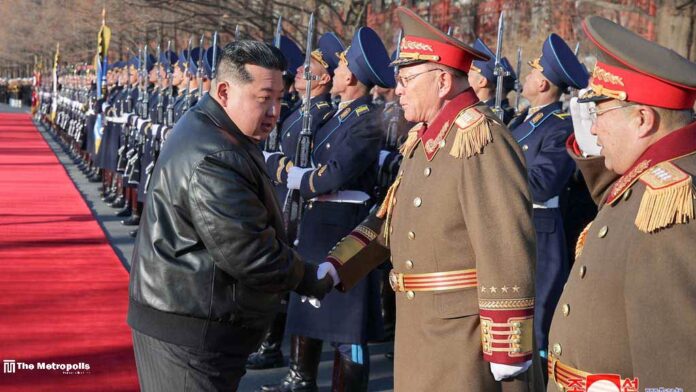North Korean leader Kim Jong Un criticized the trilateral military cooperation between the United States, Japan, and South Korea, accusing it of escalating tensions in the region and vowed to take countermeasures, including advancing the country’s nuclear capabilities.
Kim stated that U.S. deployments of nuclear strategic assets, joint military drills, and military collaboration with Japan and South Korea were creating military imbalances in the region, which posed a serious threat to security, according to state media KCNA on Sunday.
“The DPRK does not desire unnecessary tension in the region, but will take sustained countermeasures to maintain the regional military balance,” Kim remarked during a visit to the defense ministry on Saturday to mark the founding day of its army.
DPRK is the official name of North Korea, standing for the Democratic People’s Republic of Korea.
Following a meeting with Japanese Prime Minister Shigeru Ishiba on Friday, U.S. President Donald Trump expressed concern over North Korea’s nuclear program and indicated plans for engagement with the country.
However, Kim reiterated North Korea’s firm stance on continuing to develop its nuclear forces, stating, “The unshakable policy of further developing the nuclear forces” would continue.
Regarding Russia’s ongoing war with Ukraine, Kim expressed unwavering support for Russia, saying, “The army and people of the DPRK will invariably support and encourage the just cause of the Russian army and people to defend their sovereignty, security, and territorial integrity in keeping with the spirit of the treaty on the comprehensive strategic partnership between the DPRK and Russia.”
In recent months, South Korea has raised concerns about North Korea potentially sending additional troops to Russia, in addition to the 11,000 soldiers already deployed for the prolonged war.
Later on Sunday, in a separate commentary, KCNA criticized South Korea’s military activities with the United States this year and warned that further aggressive actions would result in “undesired consequences.”
“Anyone could easily guess how we would respond to the fact that they conducted more intense war exercises than ever before at a time when diplomatic schedules were being canceled due to political turmoil,” KCNA stated.



